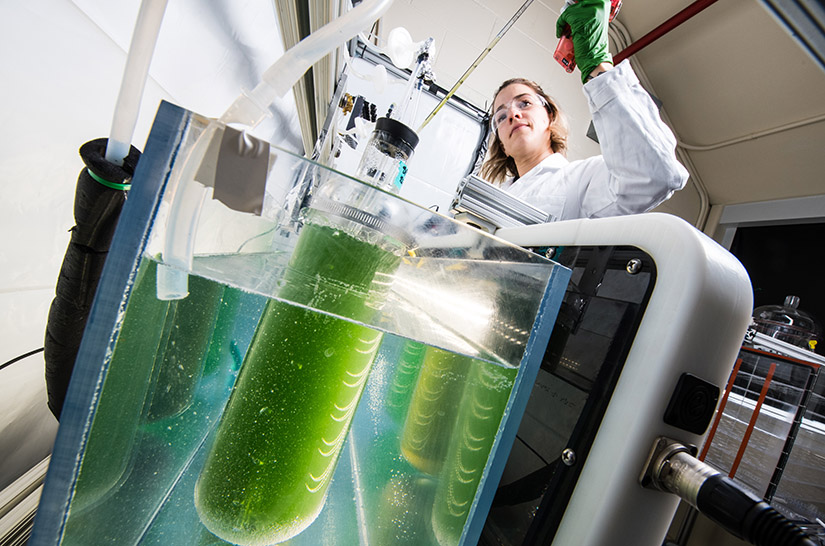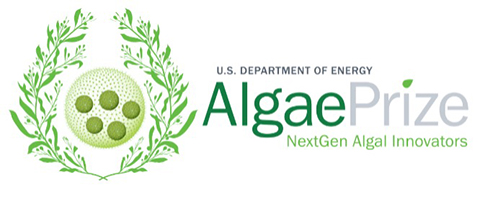15 Finalist Teams Announced for AlgaePrize 2023–2025 Competition
Student Teams Ready To Pursue Research Projects for the Development, Design, and Invention of Commercial Algae Value-Chain Technologies

The U.S. Department of Energy (DOE) Bioenergy Technologies Office (BETO) announced 15 student teams advancing as finalists in the AlgaePrize 2023–2025 competition. This year’s finalist teams include students from high schools, community colleges, and universities from 12 states across the United States and Puerto Rico.
Each finalist team receives $10,000 to conduct their proposed research over the next approximately 15 months. Teams will then present their project results to a panel of judges during the AlgaePrize Competition Weekend, April 11–13, 2025, at the National Renewable Energy Laboratory (NREL) in Golden, Colorado.
“Congratulations to the student teams selected as finalists for the second iteration of the AlgaePrize. The research ideas that were selected are unique, creative, and innovative and are designed to expand the way we think about pathways for using algal biomass for biofuels and bioproducts,” said Lieve Laurens, senior researcher and lead of NREL’s algae platform. “I know that the NREL algae research team is eager to meet the teams and see the final results presented here in Golden, Colorado, in spring 2025.”
The AlgaePrize is a DOE BETO national competition, in partnership with the Algae Foundation and NREL, which encourages students to pursue innovative ideas for the development, design, and invention of technologies within the commercial algae value chain.
This year’s competition is part of DOE’s American-Made Challenges, which represents a series of unique prize competitions designed to incentivize and reenergize American innovation in the energy marketplace.
Finalist Teams Hail From Hawaii to Puerto Rico
See below for the AlgaePrize finalist team names, locations, and brief descriptions of their proposed projects:
- AlgaeNano+, San Juan, Puerto Rico: Developing carbon nanomaterials from macroalgae for use in high-demand industries like battery manufacturing, energy, and environmental remediation.
- AlgaeUnlocked, Carbondale, Illinois: Exploring a low-energy, cost-effective, and efficient process for preparing microalgae for conversion into biostimulants and biofuels.
- Algators, Livingston, New Jersey: Investigating algal biomass as an alternative nonsynthetic fertilizer for a local farm.
- Aloha Limu, Hilo, Hawaii: Studying vertical seaweed cultivation methods to diversify and scale up production of native Hawaiian macroalgal species.
- BlazerBloom, Frederick, Maryland: Using bioflocculation with magnetotactic bacteria to harvest and dewater microalgae for conversion into biofuels production.
- Blue Genes, Fairfield, California: Creating an algae-derived dye with a focus on process optimization, improving output, and as a method to teach the community about algal products.
- Clean Green Feed, Storrs, Connecticut: Producing a sustainable strain of microalgae high in methionine for use in chicken feeds.
- Green Skies, Minneapolis, Minnesota: Applying machine-learning techniques to analyze land suitability, water stress, and economic factors to identify the best sites for Midwest microalgae growth.
- Green Thumbs, Golden, Colorado: Working to improve the harvestability of saltwater microalgae by using a novel pH-mediated-electroflocculation method.
- JCCC Chlorella Cavaliers, Overland Park, Kansas: Developing a novel strain of Chlorella expressing plastic degrading enzymes to improve water quality in ecosystems.
- Just AD Algae, Santa Fe, New Mexico: Preparing a scalable system to codigest microalgae with organic lipid waste resulting in decreased biogas production lag and increased biogas yield.
- KelBerry, Storrs, Connecticut: Employing sugar kelp alginate as an edible food coating to extend strawberry shelf life.
- Parachlorella Plastic Pals, La Jolla, California: Creating algae-based, biodegradable thermoplastic polyurethanes.
- Team ASAP, Camas, Washington; Los Angeles and Irvine, California: Developing an efficient and scalable process for the industrialization of sporophyte generation.
- The Algenius Thinkers, Austin, Texas: Studying the production of long-chain fatty acids from algae into short-chain fatty acids for lower biofuel production costs.
Preparing Student Teams for Bioeconomy Workforce
The AlgaePrize competition fosters the next generation of bioeconomy professionals by encouraging students to develop innovations that support large-scale algae commercialization.

Finalists for the second iteration of the AlgaePrize were selected by a panel of judges based on detailed synopses that described each team’s proposed research plan within the AlgaePrize’s areas of interest.
“For this second iteration of the AlgaePrize the student teams brought their creative spirit. The students really challenged themselves to think outside the box,” said Christy Sterner, BETO technology manager and DOE’s AlgaePrize program manager. “The selected finalist teams’ research plans contain truly imaginative project ideas to advance sustainable algal-based technologies in the bioeconomy. This round of the AlgaePrize includes everything from machine learning to food coatings to chicken feed to farm fertilizers to plastics, representing just a few great ideas the students proposed.”
Learn more about the AlgaePrize and the finalist teams, and follow #AlgaePrize on social media to receive the latest news.
The AlgaePrize is sponsored by BETO with support from the Algae Foundation and NREL. The AlgaePrize is part of the American-Made Challenges, a series of prize competitions designed to incentivize and reenergize American innovation in the energy marketplace.
Last Updated Jan. 22, 2026
